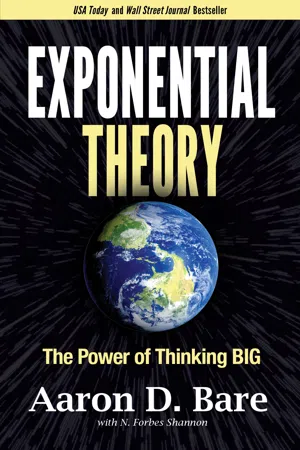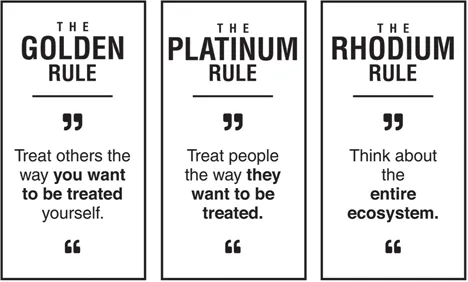![]()
Chapter 1.
What is Exponential Theory?
“I mag ination is the most p owerful force in the universe.”
—Albert Einstein
The Current Situation
Which should we cover first, the good news or the bad news?
The good news: the future is bright. The bad news: the present is not. Between human and civil rights issues, recovering from a pandemic, and a deteriorating planet, the clock looks like it is running out on us. Whether we recognize it or not, humans are at a critical point in their existence: adaptation or extinction.
With the polar ice caps melting, plastic filling our rising sea waters, level five hurricanes flooding our coastal cities2, armies of violent tornadoes3, and tsunamis crushing coastlines on a more regular basis4, the natural world around us is in constant chaos. Global weirding continues to stress the world with extreme weather conditions, causing forest fires, droughts, heat spells (global warming), cold spells (global cooling), and pushing many species toward mass extinction.5 We have seen a two-thirds decline in biodiversity in less than half a century due to environmental destruction.6
This has contributed to the emergence of zoonotic diseases such as Ebola and Covid-19.7 Environmental destruction is exacerbated by the exponentially expanding population, as humans are moving into more congested urban spaces, yet at the same time now inhabit over three-fourths of the available land on Earth. Deserts are growing while farmland and forest are shrinking as our landscape continues to change from the environmental stress. Unsustainable farming practices are creating massive soil erosion and potentially the complete loss of usable soil in less than 60 years.8 We’ve entered the Anthropocene, a new geologic time period, because of how drastically humans have altered our atmospheric, geologic, hydrologic, bio-spheric and other Earth systems.9 Is extinction evident?
The world is also in a state of political unrest. Confidence in our political leaders is at an all-time low. Truth has become optional. The United States Capitol was taken over by insurgents for the first time since 1814.10 Politics has been polarized by social media and news feeds anchor people into opposing opinions, further dividing society. Special interest groups influence both political parties and wreak havoc on democracy. Our interconnected networks have allowed hackers to expose the world’s most secure information. The world is filled with wicked problems. Wicked problems are social or cultural problems that on the face appear nearly impossible to solve because, among other things, the overwhelming number of opinions or systems that are interwoven within them.11
The nuclear arms race is ongoing, as new powers like North Korea and Iran threaten the global power structure. The fight to end racial injustice and combat police brutality has gripped the United States and the world at large. Millennials have experienced two black swan economic crises as they come into the workforce, creating huge unemployment and underemployment for youth globally. We’re in a defining moment of human existence, and we are as ill-prepared for it as we were for the economically devastating coronavirus pandemic. To some this will sound alarmist, but to others exponential theory will be a way to better explain the need for systemic change.
The universe is demanding and forcing change. However, humans are creatures resistant to change that anchor into bad routines and habits. For example, our body communicates to us, but we ignore it. When we eat the wrong things, our body tell us by giving us heartburn, gaining weight, and other skin and organ ailments. This is our body demanding dietary change. Medical Doctors can diagnose these ailments, but if the patient does not change their habits, cancer, heart attacks, and other more serious illnesses await. The world is crying out for change in much of the same way. However, things have gotten so dire we must ask ourselves, does the world have heartburn or are we having a heart attack?
Consider the people we know that struggle with abusive relationships, addiction, or criminal activity. As an outsider we can see the obvious need to change, but often those suffering are blinded by the norm of their habits or the group they identify and belong to. It’s obvious when we criticize others behavior, yet we are not always so clear recognizing our own contribution to a system that is not working for all of us. Breaking this cycle, becoming more self-aware, and stepping outside of our comfort zones will be critical to dismantle the many systemic bad habits we fight. Nothing in the exponential theory happens inside our comfort zone and the universe continues to show the sickness. The good thing is, we have the cure, we just need to apply it.
With digitization—the process of using bits and bytes, or computers to replace the world around us—humans have unlocked exponential growth and our ability to create massive change. Technology is not the answer to all our problems, yet it provides a way to accelerate the response to every problem.
Exponential growth is the hockey stick growth that every company dreams about. Exponential is a rate of change that starts slow, but then skyrockets to infinity and beyond. Change used to be the only constant, but now even change itself is accelerating. Through thinking big, digitization, and accelerating change, the exponential theory proves that no problem will be too big to be solved—be it the climate, racial divides, social/political imbalances, economic crises, or access to healthcare—although they currently appear to be impossible or unfixable. As science teaches us, nothing is permanent, we are accelerating towards potential solutions to nearly every plaguing problem on this planet. The world is in a constant flux of change.
Leaders need to focus on their people, the planet, and purpose over profit. This is a call for conscious capitalism. Capitalism should not be in question, though exponential theory will articulate the need for it to be more conscious. There is no time but the present to employ exponential theory to create the needed change to survive and hopefully thrive with a new more compassionate and creative leader that leans into the current challenges.
Godspeed.
Exponential Theory
Exponential Theory states that when leaders focus on solving big problems, they become more conscious.
Exponential Theory: The Power of Thinking Big will examine a variety of companies that are seeking to solve big problems and have become more conscious than other companies focused on just profit. In return, these companies have grown beyond comprehension. Their leaders have their eyes on impacting a billion people and understand the importance of their role in the planet, in assisting in human rights, and in living up to a massive purpose that solves an equally big problem.
Many of these companies serve two-and three-sided businesses models, leveraging platforms benefiting many different stakeholders. The platforms accelerate growth beyond models with fixed assets or companies that serve only one customer. As companies begin to think systemically, their decision criteria change quickly. The democratization of industries has invited the masses to the party and given a voice to the previously silenced. Exponential theory forces companies that want to serve the masses to become more conscious or die.
When people work on projects that focus on impacting a billion people, they are forced to think about the system rather than just satisfying one group of customers. At this level, entrepreneurs and innovators are starting to focus on universal problems and change the way the system works. Therefore, these future Goliaths are starting to do the right thing, even when no one is looking. The pressure to do so may be that today leaders and companies are under the microscope.
Thinking big, starts with our planet, then with every human, animal, and living thing in the world. The survivability, sustainability and thrivability relies on future leaders to step up to the challenge. This book will share stories of how individuals and small groups of people that are thinking big are creating most of the change we see in the world. Currently our world is a giant system out of harmony, and we can do better. Ignoring the problems of others outside of our circle is no longer possible. Growing our circle of concern will start to help us solve bigger problems.
Whether we know it or not, the planet, oceans, land, fresh water, humans, animals, biodiversity, and the entire ecosystem needs to be a stakeholder in our decisions. If we are ignorant to doing the right thing for each of these stakeholders, it will have repercussions for us sharing the same ecosystem. For far too long, we have made decisions for the short-term and decisions to benefit just a few. Our future responsibility is protecting all these elements. Thinking small does not serve us well.
An early example of this short-sighted leadership is when gray wolves were exterminated from the Greater Yellowstone Ecosystem, as they were predators and caused trouble for nearby ranchers’ herds. By 1926, gray wolves were completely eradicated. The removal directly caused an increase in the elk population, which devastated the ecosystem by disproportionately eating young trees and plants. This resulted in the demise of many trees, plants, birds and beavers turning the land into a barren forest. The glory of Yellowstone was nearly completely lost.
The reintroduction of wolves proves that by thinning the weak and sick animals, wolves create more resilient Elk herds. As Chris Wilmer’s, a wildlife ecologist at the University of California, Santa Cruz, says, “Elk are not starving to death anymore.” One decision led to a complete decimation of one of the largest wilderness ecosystems in the world.12 Nature has a way of finding balance, until humans intervene. Similarly, the overfishing of our oceans has thrown the ocean ecosystem out of balance. Simply put, if our oceans die, we die. The systemic issues of overfishing have the potential to kill the planet.13 Exponential theory seeks to understand and explain the interconnected relationships between all these seemingly disparate systems to find conscious solutions that benefit everyone in the ecosystem.
The Rhodium Rule
As leaders seek to leverage technology, they must start to become aware of the impact on other parts of the ecosystem. This leads to introducing a new rule in leadership:
The Rhodium Rule:
“Think about the entire ecosystem.”
Dating back to before biblical times, the Golden Rule was a moral rule to “Treat others the way you want to be treated yourself.” Fast forward to today, current culture would demand the Platinum Rule which states, “Treat people the way they want to be treated.” Exponential theory introduces the Rhodium Rule, “Think about the entire ecosystem.” Rhodium is the most expensive metal in the world and can be found in platinum, so Rhodium reinforces the Platinum Rule, yet introduces a value that aligns all the powers of exponential theory in a simple way.
Great innovators and entrepreneurs challenge the boundaries of many problems using the scientific method-ask questions, research, conduct a hypothesis, test a hypothesis by doing an experiment, analyze the data, draw a conclusion, and report the results. Was the hypothesis correct?
Exponential theory challenges every problem in a systematic way. Successful leaders focus on big ideas and small bets, not small ideas and big bets. For far too long, companies have bet the farm pouring billions into research and development without any proof. There is a new way to create evidence-based change based on data, feedback, and customer growth.
We are currently in the biggest explosion of disruption, as technology continues to drastically change everything. Linear thinking leaders will be blindsided by the coming big thinking innovations built on an exponential trajectory. Many current leaders have fought in a zero-sum game, yet future leaders will need to seek to expand the pie for all the stakeholders. This is proof that we are moving from a fixed mindset to growth mindset, and from scarcity to abundance. This is happening now, not in the past or the future.
When humans embrace exponential theory, we can better explain how we move from a linear to a circular economy. This new approach will help us find how to infinitely recycle, use renewable energy, clean the oceans, protect animal ecosystems, proactively heal humans, protect human rights, and salvage the climate. Humans will use exponential theory to eliminate global poverty and starvation, eliminate war (nuclear or otherwise), and make economic crises obsolete by shifting one mindset at a time from scarcity to abundance. We can move from healthcare (reactive) to wellness care (proactive) and potentially eradicate disease entirely through genetic engineering and new biotech solutions to solve nearly every medical issue. We are on the verge of massive breakthroughs nearly every day.
One thing is clear, we must begin to think about the long term, about future generatio...


